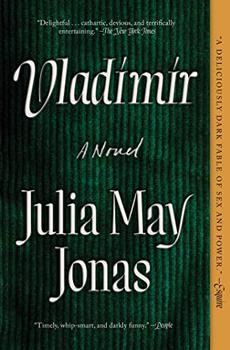Book Club Discussion Questions
In a book club? Subscribe to our Book Club Newsletter!
For supplemental discussion material see our Beyond the Book article, Don Quixote: The First Modern Novel and our BookBrowse Review of Vladimir.
Please be aware that this discussion guide will contain spoilers!
-
Brainstorm some adjectives you would use to describe the narrator, John, Vladimir, Cynthia, and Sid. Do they share any words in common? What aspects of their identities create the biggest rifts between them?
-
The cultural gap between the narrator's generation and that of her students—particularly in regards to sexual mores and gendered expectations—figures prominently in Vladimir. Recall the note she writes about her class plans (page 6), her thought process after the "Dump His Ass" confrontation (page 30-31), or her discussion with John and Vladimir about the rise of autofiction (page 45). Which of her opinions do you agree with, if any?
-
The narrator mentions her mother in a few anecdotes, and her relationship with Sid, who becomes a mother by the novel's last pages, is a central thread in the book. What is the role of motherhood in Vladimir? How does the instinct to mother shape the narrator's character?
-
Throughout Vladimir, the narrator dispenses bon mots and scathingly funny observations about everything from her well-coiffed colleague's attachment to her brush to the way a slumped Vladimir resembles a young Sid asleep in her car seat (page 108, 175). How does the narrator wield humor? What are some lines that made you chuckle?
-
In what ways does the narrator diverge from traditional gender roles and how does she conform to them? Reflect on her arrangement and understanding with John, her career trajectory, and her simultaneous disgust and obsession with her own vanity. How does this complicate her feelings for Vladimir?
-
On page 61, Cynthia visits the narrator's office and confesses, "'... I want to know you, and I want you to know me. Do you think that's strange?'" (page 61). Why do you think Cynthia is drawn to the narrator? Are her motivations genuine, or cynical as the narrator suspects? How does the narrator's jealousy of Cynthia propel the plot forward?
-
The narrator's fantasies about Vladimir span the purely erotic to melancholy Europe-set reveries about an extended life together. What does she ultimately want from Vladimir? If Vladimir left his family for her, what would happen?
-
John and the narrator unsuccessfully attempt to save a bird from itself as it rams against their window, leading the former to remark, "'The symbolism is a bit heavy-handed, don't you think?'"—an inside joke between the two of them (page 105). Can you remember other reoccurring scenes or motifs? What do you think is their implication?
-
The leering man at the diner is just one example of detestable male behavior that we are privy to in Vladimir, and yet the narrator commits the worst crime of all. How does gender affect your feelings about her actions in the final third of the book?
-
In the end, John and the narrator remain together and adopt the life of a docile, aging couple. What do you think of their decision? Has the narrator's experience with Vladimir changed her feelings about John's affairs with students? What is revealed of her psyche in the final chapter, and especially the final line?
Enhance Your Book Club
-
From Rebecca to Cheri to Lady Chatterley's Lover, Jonas sprinkles literary and cultural references of the well-read upper-middle class throughout Vladimir. Write down a list of as many you can find and split up into groups to look them up. Can you find any connections to the novel and the themes within it? You could also come up with a list of other unmentioned novels that deal with transgressive lust, aging womanhood, and messy desire, and discuss how these selections differ from or are similar to Vladimir.
-
Break up into groups to brainstorm a title and jacket summary for Vladimir's book. Refer to pages 164 and 234 for inspiration. Bonus points if you sketch a cover design.
-
The concept for Vladimir originated as a play, and now it's your opportunity to cast it! Choose your top picks for the main roles, and make a case to the larger group about who would best embody each character.
Unless otherwise stated, this discussion guide is reprinted with the permission of Avid Reader Press.
Any page references refer to a USA edition of the book, usually the trade paperback version, and may vary in other editions.
